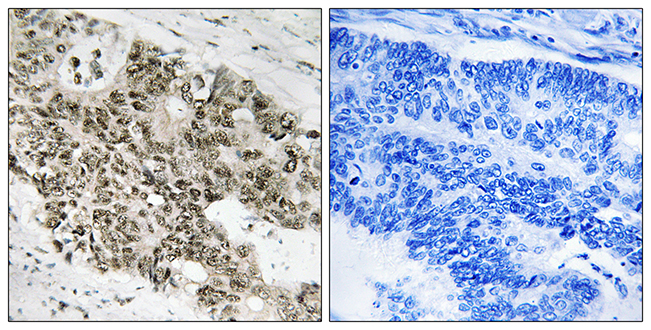ATR (phospho Thr1989) antibody [GT222]
GTX631845
ApplicationsImmunoFluorescence, ImmunoPrecipitation, Western Blot, ImmunoCytoChemistry
Product group Antibodies
ReactivityHuman
TargetATR
Overview
- SupplierGeneTex
- Product NameATR (phospho Thr1989) antibody [GT222]
- Delivery Days Customer9
- Application Supplier NoteWB: 1:500-1:3000. ICC/IF: 1:100-1:1000. IP: 1:100-1:500. *Optimal dilutions/concentrations should be determined by the researcher.Not tested in other applications.
- ApplicationsImmunoFluorescence, ImmunoPrecipitation, Western Blot, ImmunoCytoChemistry
- CertificationResearch Use Only
- ClonalityMonoclonal
- Clone IDGT222
- Concentration1 mg/ml
- ConjugateUnconjugated
- Gene ID545
- Target nameATR
- Target descriptionATR checkpoint kinase
- Target synonymsFCTCS, FRP1, MEC1, SCKL, SCKL1, serine/threonine-protein kinase ATR, ATR serine/threonine kinase, FRAP-related protein-1, MEC1, mitosis entry checkpoint 1, homolog, ataxia telangiectasia and Rad3-related protein
- HostMouse
- IsotypeIgG2b
- Protein IDQ13535
- Protein NameSerine/threonine-protein kinase ATR
- Scientific DescriptionThe protein encoded by this gene belongs the PI3/PI4-kinase family, and is most closely related to ATM, a protein kinase encoded by the gene mutated in ataxia telangiectasia. This protein and ATM share similarity with Schizosaccharomyces pombe rad3, a cell cycle checkpoint gene required for cell cycle arrest and DNA damage repair in response to DNA damage. This kinase has been shown to phosphorylate checkpoint kinase CHK1, checkpoint proteins RAD17, and RAD9, as well as tumor suppressor protein BRCA1. Mutations of this gene are associated with Seckel syndrome. An alternatively spliced transcript variant of this gene has been reported, however, its full length nature is not known. Transcript variants utilizing alternative polyA sites exist. [provided by RefSeq]
- ReactivityHuman
- Storage Instruction-20°C or -80°C,2°C to 8°C
- UNSPSC12352203


